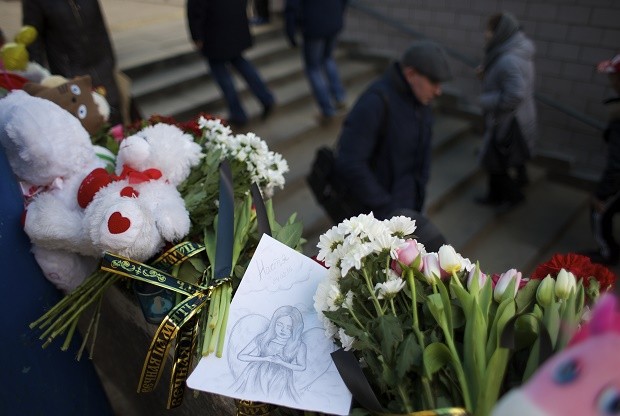
A child’s illustration shows an angel among flowers outside a subway station in Moscow, Russia, on Tuesday, March 1, 2016. Russian police on Monday arrested a woman who was seen waving the severed head of a small child outside a Moscow subway station. She is suspected of killing the child when it was in her care. AP
MOSCOW, Russia — The Kremlin on Tuesday defended a controversial media blackout on the grisly murder of a toddler allegedly killed and decapitated by her nanny who then paraded the bloodied head on a Moscow street.
The death of the girl named Nastya, said by investigators to be just three or four years old, has shocked usually hardened Muscovites.
City residents turned out to lay flowers at the metro station where the black-clad nanny was spotted pacing up and down on Monday, waving the severed head of a child and threatening to “blow everyone up”.
READ: Afghan militia beheads ISIS fighters | Saudi beheadings soar in 2015 under discretionary rulings
The suspect — dubbed “the bloody nanny” in the media — was detained on suspicion of butchering the girl, who had suffered from learning disabilities and epilepsy, at the family’s apartment in northwestern Moscow, before setting fire to the home and fleeing.
The agitated woman, who was reportedly also shouting “Allahu Akbar”, has been sent for psychiatric examinations, investigators said.
The suspect, identified as mother of three Gyulchekhra Bobokulova from Muslim-majority Uzbekistan, was set to appear in a court on Wednesday, with a judge expected to place her under official arrest.
Many questioned the professionalism of police after she was allowed to pace up and down outside the metro station with the head for about 20 minutes.
A spokeswoman for the Office of the General Prosecutor said a probe would be launched into the matter.
The mass-circulation Moskovsky Komsomolets, citing Uzbek police, said the woman, aged in her 30s, had suffered from schizophrenia for 15 years.
Komsomolskaya Pravda, citing a close family friend, said the live-in nanny had recently become very religious, spent a lot of time online and had brought home a prayer mat.
‘Too monstrous to show’
While footage of the shocking incident was released by several small television stations, national broadcasters did not report the murder.
President Vladimir Putin’s spokesman denied the state-controlled channels had received a gag order from the Kremlin but said the presidential administration approved of their decision.
“As far as we know, the channels indeed have taken a decision not to show this horrible tragedy,” said Dmitry Peskov.
“And it seems to me, one can only express solidarity with this decision of the channels because this is probably too monstrous to be shown on television.”
He said the move was in line with international practice and was the channels’ “civil stance.”
The tragedy jolted a usually dispassionate Moscow and by Tuesday evening mourners had laid heaps of flowers, toys, chocolate bars and balloons at the entrance to the Oktyabrskoe Pole metro station.
Some people at the scene made the sign of the cross, while Muslims prayed. A call was made on social media for a memorial rally later Tuesday to support the family.
‘Parallel reality’
Critics derided the media blackout, charging that national television would provide blanket coverage of a similar tragedy were it to happen in the West.
Others noted that nothing had prevented state-controlled Channel One from airing a false report claiming the Ukrainian army had nailed a three-year-old boy to a board in the east of the country in 2014.
“One simply needs to understand that federal media tell stories not about life in Russia but about a parallel reality in Ukraine, Europe, and Syria,” wrote Sergei Medvedev, a professor at the Higher School of Economics.
Some experts said the Kremlin did not want to inflame anti-immigrant or nationalist sentiments.
Channel One’s deputy general director Kirill Kleimyonov said the gruesome footage could not be shown “under any circumstances”.